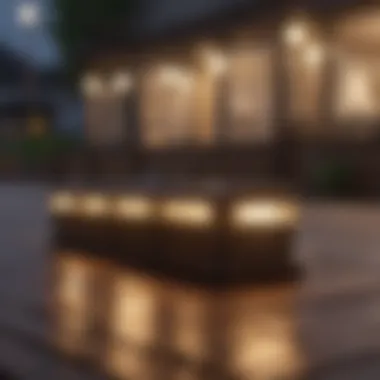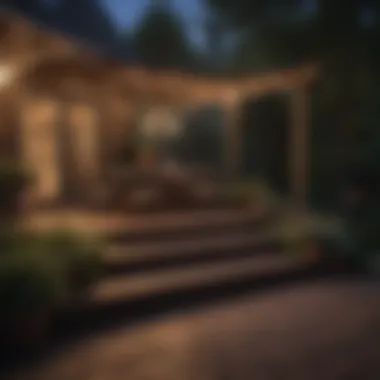Best Deck Lights: A Comprehensive Guide


Intro
Deck lighting forms an essential component of any outdoor space, both enhancing aesthetics and ensuring safety. As homeowners increasingly recognize the importance of outdoor environments, the choice of deck lights becomes paramount. This guide seeks to offer a thorough exploration of the best options available, taking into account various styles, functionalities, and energy efficiencies. The relevance of this topic cannot be overstated—proper lighting not only beautifies the area but also influences how outdoor spaces are utilized during the evenings.
Various types of deck lights exist, ranging from functional to decorative. This article will break down these options into comprehensive categories while providing insights and practical tips. By understanding your choices, you will be empowered to make informed decisions that suit your specific design vision and practical needs.
Design Trends
Deck lights must align with modern design aesthetics to create impressive outdoor areas. Here, we discuss emerging trends in design and styles for deck lighting.
Current Popular Styles
Recent years have seen a shift towards minimalistic and sleek designs. Recessed lighting and strip lights are highly sought after for their ability to blend seamlessly into any deck. These lights can be built into steps or railings, providing a clean look while being functional.
On the other hand, lantern-style lights and vintage bulb strings bring a classic warmth to outdoor spaces. These styles often become focal points, especially during social gatherings.
A few popular styles include:
- Recessed lights: these provide subtle and elegant illumination.
- Lanterns: adding a rustic touch while being versatile in placement.
- Solar-powered lights: energy-efficient and eco-friendly options for ease of use.
Color Palettes for Modern Spaces
The color choices for deck lighting can dramatically enhance a space's mood and utility. Neutral colors like soft whites and warm tones complement most outdoor designs, creating a welcoming atmosphere. Colored lights are gaining popularity too, like shades of blue and green that work well to create specific moods or highlight landscaping.
When selecting colors, conside the overall theme of your outdoor area. Warm tones tend to promote relaxation, while cooler colors can create a dynamic, more vibrant space.
"The right lighting can transform an ordinary deck into an extraordinary experience, allowing homeowners to maximize their outdoor enjoyment day and night."
Investing in the right deck lights integrates functionality with design. With this guide, readers can confidently explore options that enhance their outdoor spaces, making it a versatile area for entertainment, relaxation, and aesthetic pleasure.
Prelims to Deck Lighting
In this article, we explore the nuances of deck lighting, shedding light on its significance in enhancing outdoor living areas. Deck lights are not merely decorative; they also improve safety, functionality, and the overall ambiance of the space. Homeowners, interior design enthusiasts, and even gardening aficionados can benefit from understanding how to utilize these lights effectively.
The Importance of Deck Lights
Deck lights serve multiple purposes. First, they increase safety during nighttime use, guiding footsteps and minimizing trip hazards. When strategically placed, these lights illuminate paths and edges, making movement more secure. This becomes especially crucial for family gatherings and social events, where many people navigate the space.
Moreover, deck lights augment aesthetic appeal. They highlight architectural features, landscaping, and outdoor furniture, contributing to an inviting atmosphere. A well-lit deck becomes a captivating space for evening parties or quiet nights outdoors.
There is also a psychological element at play. A beautifully lit area can affect mood positively. Soft lighting creates a feeling of warmth and coziness, making outdoor spaces more livable after dark.
Purpose and Functionality
Understanding the purpose and functionality of deck lights is essential for making informed choices. The primary function of these lights is illumination. They lead the way for safe navigation, but their utility does not stop there. Deck lights can enhance the beauty of your outdoor setting, thus contributing to the desired ambiance.
Different types of deck lights serve various needs. For instance, post cap lights are perfect for illuminating posts, while step lights focus on staircases to prevent accidents. String lights add a festive touch to gatherings, creating a relaxed yet stylish environment.
The installation and selection of these lights involve considerations like brightness, energy efficiency, and design compatibility with the overall decor. As we delve deeper into the various options in this guide, you will gain insights into how to choose the ideal deck lights that align with your specific needs.
Types of Deck Lights


Deck lights come in a variety of types, each serving unique purposes and enhancing your outdoor environment differently. Understanding the various kinds of deck lights allows homeowners and designers to tailor their choices based on functionality, design preferences, and desired ambiance. The importance of this section lies in helping individuals make informed decisions that cater to both aesthetic and practical needs.
Post Cap Lights
Post cap lights are mounted on top of deck posts. These lights provide illumination and can add an attractive feature to your deck. They are particularly effective for marking edges to improve safety during nighttime. When choosing post cap lights, consider the style and color that aligns with your deck design. They can be powered by electricity or solar energy, making them versatile options. Solar post cap lights are environmentally friendly and reduce energy costs, appealing to many homeowners.
Step Lights
Step lights are essential for safety, especially on steps and staircases that may be used frequently at night. They can be recessed into the wall or installed as surface-mounted fixtures. Step lights illuminate the area, reducing the risk of falls while creating a welcoming atmosphere. Homeowners should consider brightness options as well, ensuring the lights are not too harsh or too dim. They are ideal for adding both functional light and a design element to your outdoor space.
Rail Lights
Rail lights are typically installed on deck railings to enhance safety and create a cozy atmosphere. They can be mounted directly onto the railing or incorporated within the design of the railing itself. Like other types of deck lights, their placement can significantly impact the ambiance. When selecting rail lights, look for options that complement your deck’s color scheme and overall design. Also, energy efficiency and maintenance requirements should guided the selection process.
In-Deck Lights
In-deck lights, also known as recessed deck lights, are installed flush with the surface of the deck. This creates a seamless look while providing ambient lighting. These lights work well to highlight certain areas without the clutter of visible fixtures. They can be used to outline pathways or accentuate features like planters. Installation may require more effort compared to other lights and it is important to ensure proper waterproofing. In-deck lights can offer not only safety but also an elegant look for any outdoor space.
String Lights
String lights are a popular choice for homeowners looking to create a festive atmosphere. These lights can be hung from railings, trees, or pergolas and are known for their versatility. They can be used for formal gatherings or casual get-togethers, adapting to various moods and occasions. Different styles of string lights are available, from globe to Edison bulbs, which can suit different design preferences. Additionally, selecting energy-efficient LED options for string lights can greatly reduce energy usage while still providing desired ambience.
Energy Efficiency Considerations
When selecting deck lights, energy efficiency is vital for several reasons. These factors not only contribute to the environment but also affect your long-term costs. Homeowners and enthusiasts alike need to evaluate their options thoroughly before making a decision.
LED vs. Traditional Bulbs
The debate between LED and traditional bulbs is significant when it comes to deck lighting. LED lights are known for their high efficiency. They consume far less energy compared to incandescent or halogen lamps. This can lead to savings on electricity bills. Moreover, LED lights tend to last much longer, sometimes even up to 25,000 hours. This longevity makes them a cost-effective choice in the long run.
Additionally, LEDs generate less heat, reducing the risk of burns and fire hazards. They are also available in various color temperatures. This range allows for customization of outdoor ambiance.
On the other side, traditional bulbs are less efficient. They waste a lot of energy as heat. Typical incandescent bulbs last about 1,000 hours, which is significantly shorter compared to LEDs. This means replacements are needed more often.
Key comparisons include:
- Energy Use: LEDs consume up to 80% less energy.
- Lifespan: LEDs can last 25 times longer than incandescent bulbs.
- Heat Production: LEDs produce minimal heat.
In summary, when considering deck lighting, LEDs should be a frontrunner due to their energy efficiency, longevity, and safety advantages.
Solar-Powered Options
Solar-powered deck lights represent another excellent energy-efficient alternative. They harness solar energy, meaning they require no electricity from the grid. These lights are especially useful in areas that lack access to electrical sources. They typically use solar panels to convert sunlight into energy. In daylight, these panels charge built-in batteries so that lights illuminate automatically at night.
One of the appealing aspects of solar lights is that they are often easy to install. There are no wiring complications or expensive consultations needed. Just place them where there is good sunlight exposure. While their performance can depend on weather conditions, advancements in technology have significantly improved their reliability.
However, solar lights may not provide as much brightness as LED options. They are best for ambient lighting or guiding pathways rather than bright task lighting.
Considerations for solar options include:
- Location: Ensure lights are positioned for optimal sunlight.
- Battery Quality: Higher quality batteries can improve performance.
- Features: Some models come with adjustable brightness settings.
Choosing the Right Deck Lights


Choosing the right deck lights is crucial in achieving the desired ambiance and functionality for outdoor spaces. The right selections will not only enhance the visual appeal but also improve safety and usability. Deck lights come in various forms and styles, making the choice overwhelming at times. Therefore, understanding essential components such as space assessment, design aesthetics, and brightness levels makes this process less daunting.
Assessing Your Space
Before diving into purchasing deck lights, you need to thoroughly assess your outdoor area. Understanding the layout, size, and layout's specific features will inform your choices significantly. For instance, a large deck may require multiple lighting fixtures to ensure adequate illumination, while a smaller space can benefit from fewer, strategically placed lights.
Consider these elements:
- Dimensions: Measure the area you want to light. The size will help you determine how many lights you'll need.
- Existing Features: Take note of obstacles like trees, furniture, or railings. These elements can influence light placement and types.
- Desired Zones: Identify areas you want to illuminate, such as pathways, seating areas, or stairs. Different zones may necessitate different types of lighting.
Design Aesthetics
Next, aesthetics play a significant role in your decision-making process. Deck lights should complement the overall look of your outdoor space rather than clash with existing decor. Consider the following:
- Style: Do you prefer a modern, minimalist look, or something more traditional? Choose lights that match your preferred style to create a cohesive environment.
- Material: The material of the lights can affect durability and appearance. Stainless steel, aluminum, and plastic are common. Each has its merits based on weather resistance and looks.
- Color Temperature: The warmth or coolness of the light could influence the mood you want to set. Warmer lights often make a space feel cozy, while cooler lights may provide a sharper, more crsip appearance.
Brightness Levels
Finally, brightness levels must be taken into account when making your choice. The amount of light your fixtures emit will affect both safety and ambiance. Here are some points to consider:
- Lumen Output: This measurement indicates how bright a light will be. More lumens mean brighter light. Pathways and steps may require higher lumen output for safety.
- Dimming Options: Some lights come with dimming capabilities. This feature allows you to adjust brightness according to mood or time of day, which adds versatility to your outdoor environment.
- Layering Light: Use varied levels of brightness for different areas. For example, softer lights around seating areas can create a relaxing atmosphere, while brighter lights on pathways enhance visibility.
With the right selection of deck lights, you can transform your outdoor spaces into functional and beautiful areas.
In summary, selecting the right deck lights involves evaluating your space, aligning aesthetics with your vision, and choosing appropriate brightness levels. Paying attention to each of these components will result in a cohesive and well-lit outdoor gathering spot.
Installation Tips
Proper installation is essential for maximizing the benefits of deck lights. A well-planned setup not only enhances the aesthetic appeal of your outdoor space but also ensures safety and functionality. Poorly placed lights can create shadows, cause tripping hazards, or result in wasted energy. Therefore, understanding the process of installation is key to achieving the desired effect of illumination and ambiance.
Planning Your Layout
When designing the layout for your deck lights, consider the overall function of your space. Is it for family gatherings, quiet evenings, or perhaps both? Begin by evaluating the areas that require illumination. Focus on key spots, such as stairs, pathways, and seating areas. The goal is to create a cohesive design that provides adequate lighting while maintaining the style of your deck.
Here are some points to consider during your layout planning:
- Identify High-Traffic Areas: Mark spots that people frequently traverse. Ensuring visibility in these zones helps prevent accidents.
- Layer Your Lighting: Utilize different types of lights, such as post cap lights for height and step lights along the stairs, to achieve a balanced effect.
- Spacing Matters: Keep an eye on how far apart each light should be. Too close can lead to overwhelming brightness, and too far apart can leave dark spots.
- Experiment with Placement: Use temporary fixtures to test different configurations. Adjust the placement based on how the light interacts with your space.
Safety Precautions
Safety is the most important consideration during installation. Electrical issues or improperly positioned lights can lead to hazards that undermine the benefits you aim to achieve.
Keep these safety tips in mind:
- Follow Guidelines: Always adhere to local electrical codes when extending wiring or installing fixtures. Consulting a professional electrician can be beneficial if you are unsure.
- Waterproofing: If your lights will be exposed to moisture, ensure that they are rated for outdoor use. This prevents short circuits and improves durability.
- Low Voltage Options: Consider installing low-voltage systems. They are easier to handle and pose less risk of electrical shock.
- Test Your Illumination: Before finalizing the installation, turn on the lights to ensure everything works correctly. Verify that there are no dark or overly bright areas.
"Proper installation starts with a good plan. Understanding your space allows for a sensible approach that combines aesthetic appeal with safety."
Maintenance and Longevity
Maintaining deck lights is crucial to ensure their long-term functionality and aesthetic appeal. Proper care can significantly extend the lifespan of the lighting fixtures and maintain their efficiency. Homeowners should view maintenance as part of the investment in outdoor space. As elements like dust, moisture, and weather can impact performance, a routine maintenance plan is beneficial. This helps avoid issues that can arise from neglect and saves costs on replacements.


Cleaning Your Lights
Cleaning your deck lights should be a priority in your maintenance routine. Only by regularly removing dirt and debris can you ensure lights reach their full brightness. Most fixtures can be cleaned simply with water and mild soap. Here are some steps to consider:
- Turn Off Power: For safety, always turn off the power before cleaning.
- Use a Soft Cloth: A soft cloth or sponge works best to avoid scratching the surface of your lights.
- Inspect for Damage: During cleaning, check for any cracks or signs of wear, as this can indicate a need for replacement.
- Rinse and Dry Thoroughly: Ensure all soap is rinsed off, and allow all fittings to dry completely before powering back on.
Regular cleaning not only improves the functionality but also enhances the look of your outdoor space. Dirty lights may cast uneven shadows and affect the overall appeal of the deck.
Troubleshooting Common Issues
Even with regular maintenance, problems can sometimes occur with deck lights. Knowing how to troubleshoot issues can save time and hassle. Here are some common problems and their solutions:
- Lights Not Turning On: First, check if the lights are properly connected. If they are hard-wired, inspect the breaker and connections. For solar options, ensure the solar panel is clean, and batteries are charged.
- Flickering Lights: This could indicate a loose connection. Inspect connections thoroughly. If the issue persists, it may be necessary to replace the bulb or fixture.
- Uneven Brightness: If some lights are brighter than others, check for blockages, such as dirt on lenses or misalignment. Make sure the fixtures are installed at the same level for uniform intensity.
Regular inspection and troubleshooting can mitigate larger issues and ensure the longevity of the deck lighting. A well-maintained system increases safety and enhances the ambiance of outdoor areas.
"Prioritizing maintenance leads to a better experience and longer-lasting beauty in your outdoor setting."
Top Brands and Products
When it comes to deck lighting, choosing the right brand is essential. The market is filled with an assortment of options, but not all brands deliver the same level of quality. A good brand signifies reliability, durability, and effective customer support. Investing in well-regarded brands can prevent the frustration that comes with poor performance or constant replacements. Thus, understanding the various brands available is a critical step in making an informed decision.
Overview of Leading Brands
Several brands stand out in the deck lighting industry. These brands have established their reputation through years of innovation and customer satisfaction. Here are a few notable ones:
- Ring: Known for their smart outdoor lighting solutions. Their options integrate seamlessly with home automation systems. This brand is very popular for those who want control over their lighting.
- Sunset Lighting: Focused on sustainable outdoor solutions, they offer a broad range of solar-powered deck lights. This appeals to eco-conscious homeowners.
- Kichler: They provide high-quality and stylish options designed for various aesthetics. Their products range from modern to traditional styles, catering to diverse tastes.
- LEONLITE: Specializes in energy-efficient lighting fixtures that do not sacrifice design. They are offten recommended for those who prioritize LED options.
Recognizing these brands opens the door to understanding their unique features, such as color temperature, energy efficiency, and design versatility.
Product Recommendations
When selecting deck lights, specific products within these leading brands stand out due to their functionalities and features. Here are some recommended options:
- Ring Smart Outdoor Flood Light: Highly rated for its powerful illumination and app connectivity. It is ideal for homeowners looking for smart technology integration.
- Sunset Lighting Solar-Powered LED Post Cap Lights: These lights offer a warm glow and do not require wiring. They are perfect for environmentally aware individuals who want hassle-free outdoor lighting.
- Kichler Landscape Lighting Solutions: Their range includes spotlights and path lights that blend style with high-quality performance. Opting for these can enhance your deck’s appearance remarkably.
- LEONLITE LED Deck Lights: Known for their energy efficiency and excellent brightness levels. They are ideal for users looking for long-lasting, effective lighting solutions.
Choosing a reputable brand and the right products can significantly enhance the aesthetic and functional aspects of your deck. Hence, it is crucial to align your choice with your specific needs.
The End
In the discussion of deck lighting, drawing together all insights is crucial. The role of deck lights extends far beyond mere illumination. They contribute to the aesthetics, safety, and functionality of outdoor spaces. Choosing the right lighting allows homeowners to transform basic decks into inviting areas. A well-lit deck can enhance social gatherings, provide a sense of security, and encourage outdoor activities during the evening hours.
Effective deck lighting incorporates various styles and functionalities. Depending on the design of the home and preferences of the homeowner, options ranging from post cap lights to solar-powered fixtures are available. All these lighting types serve specific purposes, making thoughtful selection important.
When considering deck lights, energy efficiency must also be factored into decision-making. Each type of deck light—from LED options to solar-powered varieties—offers benefits worth exploring. This not only impacts long-term costs but also aligns with growing environmental concerns. Affordable and sustainable solutions can go hand-in-hand, satisfying both aesthetic and practical requirements.
Moreover, regular maintenance and understanding the installation processes lead to longevity and effectiveness of the lights. Addressing potential issues and employing proper cleaning methods can ensure that deck lights function optimally over time.
Overall, the significance of deck lighting hinges on aspects such as aesthetics, safety, and efficiency. Homeowners can greatly enhance their outdoor spaces through informed choices, leading to enjoyable evening experiences.
"Properly selected deck lights can elevate the quality of outdoor living spaces significantly."
Final Thoughts on Deck Lighting
As we conclude this comprehensive overview, it becomes evident that investing in quality deck lighting is a thoughtful move for any homeowner. The right products not only beautify a space but also improve safety and usability.
Consider the physical layout of the area. Harmonius integration of lighting can contribute to an inviting atmosphere while balancing brightness levels. Collecting information from reputable sources about leading brands and the unique attributes each offers can simplify the selection process.
Finally, assess personal style and needs while remembering to align with energy efficiency practices. Tailoring deck lighting choices can result in an outdoor area that reflects individual taste while providing functional advantages. Embracing effective deck illumination truly makes a difference in how spaces are used and enjoyed.















